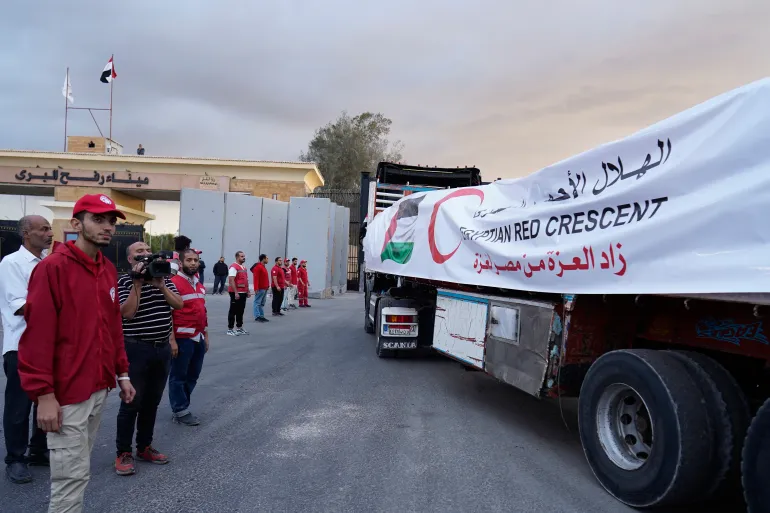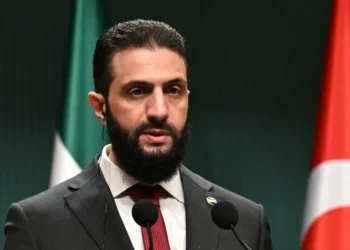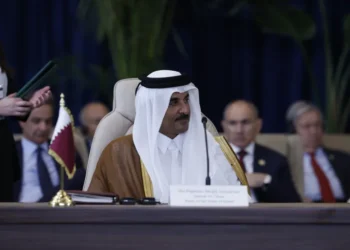Israel has been urged to open more crossings into Gaza to allow “thousands of trucks” to enter the devastated territory every day.
Preparations are being made to allow convoys through the southern Rafah crossing with Egypt on Thursday, the first such access through the critical entry point since May last year.
However, humanitarian officials are also calling for other entry points to be opened, including a crossing to northern Gaza, which would allow vital supplies to reach hundreds of thousands of Palestinians who have travelled across the territory in recent days to reach their shattered homes.

Tom Fletcher, the UN’s most senior relief Coordinator, called on Israel to facilitate the “massive surge of humanitarian aid – on which so many lives depend, and on which the world has insisted.”
“We need more crossings open and a genuine, practical, problem-solving approach to removing remaining obstacles. Throughout this crisis, we have insisted that withholding aid from civilians is not a bargaining chip. Facilitation of aid is a legal obligation.”
Tom Fletcher
Aid agencies say thousands of tonnes of aid, including food and medical supplies, has been loaded on to trucks waiting in Egypt or stockpiled elsewhere in the region.
Tess Ingram of UNICEF, speaking from southern Gaza, said, “We had heard that Sunday would be the first day of a big scale-up of aid coming in but what we’ve seen so far is in very sharp contrast to how high and desperate the needs are.”
“People are not sure when they are next going to get any water. There is not enough food. We had 45 outpatient nutrition clinics open in August, now there are just seven.”
Tess Ingram
Humanitarian officials in Gaza City said on Wednesday assistance was desperately needed, with hundreds of thousands of people without clean water, food and other essentials and many more suffering greatly.
The fragile ceasefire in Gaza had faced its first test when Israel on Tuesday accused Hamas of failing to comply with the deal signed last week by delaying the return the bodies of hostages.
In retaliation, Israel said it would cut the number of trucks it would allow into Gaza to 300, half the total agreed in the ceasefire deal, and postpone indefinitely the opening of the Rafah crossing.
Rafah has been shut since it was seized by Israeli forces in May 2024, limiting entry into Gaza from Israel. Israel has repeatedly blocked aid from entering Gaza during the conflict, prompting accusations it has used starvation as a weapon of war. A famine was declared in parts of the territory in August.
The EU said that it was on standby to deploy a longstanding humanitarian mission, known as a EUBam (EU Border Assistance Missions), at the Rafah crossing if conditions on the ground improved.
WHO Says Necessary To Bring Medical Supplies Into Gaza
Meanwhile, the World Health Organization(WHO) said that it’s necessary to immediately bring in medication, hospital equipment, and fuel to Gaza’s dilapidated hospitals.
Dr Hanan Balkhy, Head of WHO’s eastern Mediterranean office, stated that heavy machinery to rebuild destroyed medical facilities is also urgently required.
“We’re having a whole lot of hope that the ceasefire … will be long lasting and that we can open up and do the work that we need to do with our other UN agencies and with our partners on the ground.”
Dr Hanan Balkhy
Ongoing WHO missions are now focused on picking up more trucks from the Karem Abu Salem (Kerem Shalom) crossing and resupplying beleaguered hospitals.
Trump’s proposed plan calls for “full aid” to enter Gaza. Later phases of the plan call for Hamas to disarm and give up all power, which it has so far refused to do, instead launching a security crackdown to reassert its authority in Gaza through public executions and clashes with local clans.
READ ALSO: A Brewing Debt Storm Threatens Ghana’s Recent Economic Gains






















